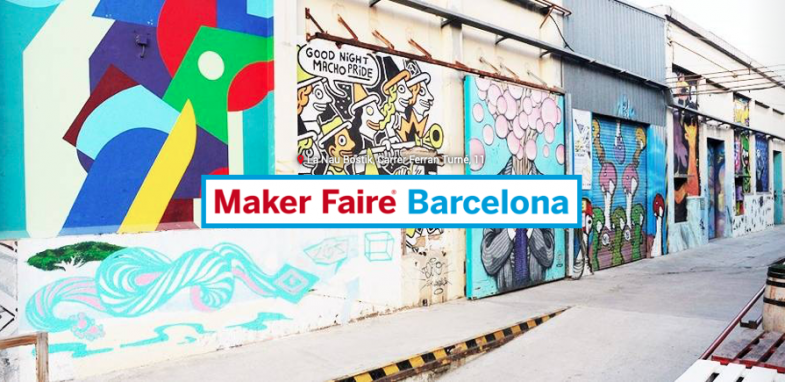
PATHWAYS
TO A CIRCULAR ECONOMY
REINVENT, REDESIGN, REPAIR, REUSE AND RECYCLE
October 5 & 6th, 2019, Nau Bostik, Barcelona
This sixth edition sets its location at Nau Bostik, an emblematic citizen led cultural center, in the neighborhood of La Sagrera. Referring to artistic creation and social innovation, it brings together and hosts a solid, restless and vigorous associative network of socio-cultural agents.
This location it is not by chance since Maker Faire Barcelona 2019 wants to emphasize the urgent need to rethink and activate a new model of local and scalable economy: research, learning, entrepreneurship, production, employment and responsible consumption for the city, highlighting the central role of the Circular Economy, Resilience and Creativity.
Maker Faire Barcelona 2019 brings together the local and international Maker Community, understanding this community as a broad universe that unites researchers and practitioners of the Maker movement, Universities, Research Centers and Socially Innovative Enterprises.
The meeting between makers, technologists, scientists and enterprises wants to promote the interaction between different initiatives and a wide variety of proposals. A main goal is to foster cross-pollination between projects and participants.
The aim is, on one hand, to promote the integration of Science and academic and business Technology with an ecosystem of fast-growing innovation like the Maker Movement. On the other hand, to encourage the meeting between the best researchers and creators of all three systems and, at the same time, favoring the transmission of knowledge and practic among the general public.
In this framework, a significant selection of projects will be presented within the framework areas of the Circular Economy & Creativity.
CIRCULAR ECONOMY
In the last 40 years the global use of finite raw materials has almost tripled, from 26.7 million tonnes in 1970 to 84.4 million in 2015 and a recent report by Circle Economy, pointing out that by 2050. If nothing stops it, misuse could reach 170/184 million tonnes, numbers that exhaust the planet’s sustainable limits.
This meltdown generates unprecedented amounts of waste. As raw materials decline and waste increases, the linear economy model “extract, make, use and pull” causes great pressure on the natural environment and calls for an urgent reconsideration.
A circular and resilient economy describes a new economic system where nature and people are studied as a single set, and it is also the reduction, reuse, recycling and recovery of materials and processes of manufacturing of local, clean products , intensives in knowledge and in labor.
RESILIENCE AND CIRCULAR ECONOMY IN THE CITIES
Cities that hold more than half of the world’s population represent ideal environments, laboratories to understand how to design and scale sustainability through resilience and circularity, possibly the two most important characteristics for the future of people.
The transition to a circular economy means rethinking all aspects of urban life. This includes searching solutions and consumption habits so that raw materials and products remain in circulation beyond the programmed service life, thus minimizing the loss of finite resources offered by the planet during the production and consumption processes.
The growing availability of low cost tools and technologies, digital distribution, research, local manufacturing and a new circular economic logic that lies in the very heart of the Maker culture, make a decisive change for a society dependent today on a linear and centralized production.
Speakers Corner Program:
12:15 – 12:45h Technological disobedience
Ernesto Oroza (Artist, designer and Cuban writer)
In conversation Tomas Diez (FabLab Barcelona)